- Home
- Cynthia Kadohata
The Glass Mountains Page 9
The Glass Mountains Read online
Page 9
Another day I saw a lady who moved across the sand as gracefully as a Bakshami. She’d covered her hair and half her face with veils, and an entourage attended to all her needs. Lokahn said she’d served as queen of a tiny monarchy I’d never heard of. Her husband had gone off to war with another tiny monarchy nearby and hadn’t returned. So she’d traveled to the hotlands to ask the elders what had become of her king. At first they all refused to answer her question, but finally an old woman told her that her husband had returned from war not long after she’d set out for Bakshami. Finding her gone, he’d waited and waited but then had fallen in love with a princess from an adjoining sector. So now the queen didn’t know where to go or what to do. She belonged nowhere. She wandered around from saloon to saloon covered in veils.
That night as I lay in a bed of the softest fur I’d ever felt, I looked out the window at the stars glistening with such clarity off the mountains that they seemed to inhabit the glass rather than hang in the sky; and I thought about how, way beyond those mountains, a queen had walked for longer than any of us to learn her husband’s fate. And about how even now, despite the war, more robbers and graceful queens, more politicians and ambitious scum, were embarking on the journey to the hotlands, pulled here by the elders as the people of my village had been. And I decided that had I been the veiled queen and had I loved my king, I would have done the same thing she did. I wondered whether the people of my village had made a similar mistake by coming here. But before falling asleep I saw the beauty of the stars shining through the swirls of dust above the village, and when I woke up I saw the sun shining through the Glass Mountains. Despite this beauty, or because of it, my heart filled with pain, and I wished Maruk could be lying there next to me, so that I could stroke his beautiful face as he dreamed happily of wars and knives and a violent world I could not even imagine.
3
Later that week, after we’d rested up and feasted every night, sucking the marrow out of fresh furrto bones and eating dried fruit for dessert each night, Tarkahn called a meeting. We met in Lokahn’s saloon, deserted because it was still morning. Some of our stomachs had grown as large as a pregnant woman’s because of our overeating, and I myself never went anywhere without bones and fruit stuck in my pockets. Tarkahn said, “Now I don’t know quite how to say this, because I love you all like I love my wife, which of course is not strictly true since I know my wife much better and we have a much deeper and more complicated love than I’ll ever know with any of you, but nevertheless I do love you all, but that isn’t the point, or rather it’s only part of the point...” My head spun over his words, and when I recovered from my spin I found myself craving food.
“...and in conclusion I want to suggest that perhaps it’s time for each of us to go our separate ways, since after all our numbers are small and our needs varied, and since regardless of what you people decide, my wife and I have decided to stay here and start having babies, since the answer to all the deaths the Formans have caused is to have more babies...” His voice grew softer then, either because of emotion or so that others could interject their thoughts.
Ansmeea, now of age to make her own decisions, said, “I’ve decided to stay as well. As a matter of fact I’ve found work at one of the saloons.”
One by one, everyone, including Jobei, Leisha, and myself, stated a preference to stay. I felt certain my destiny lay in stuffing my mouth full each night, and sleeping soundly among the remaining people of my village.
Still, since we were there anyway, several of us decided to make appointments with the elders to get advice. The appointments secretary scheduled a morning appointment for Tarkahna and me to come together.
Sometimes patrons of the elders made an appointment and ended up with twelve or more spellbound elders explaining their fate; other times people made an appointment and ended up with just one seemingly indifferent elder.
The elders held appointments in a large, elegant building in the center of town, like the hub of wisdom surrounded by spokes made of saloons. The walls inside and out were pinkish rock. Outside the doorway stood worn statues of the mythological blue firebeast and the kind Soom Kali man who was the first settler of Bakshami. A crack ran through the torso of the firebeast, and the first settler’s nose was worn down to a small mound. A man outside the door waved booklets. “Catalogues of the elders! You name the price. Descriptions of all the elders and their specialties. Love! Money! Hate! There’s an elder to predict any aspect of your future. Power! Philosophy!”
Inside, about forty people sat, stood, or wandered around the waiting room. Some of them, including me, had brought their pets, and the room smelled faintly of dog. There were no chairs, so Tarkahna and I sat on the floor next to a nervous woman who kept rubbing and scratching her hands and a tranquil, almost sleepy man who stared straight ahead with a slight smile on his face.
“Have you come far?” I asked him.
“It’s been so long I’ve forgotten,” he said reflectively. “I arrived here a few weeks ago, but now I find I don’t care what the answers to my questions are. I just want to find out how I can get out of here by a simple route. But I can’t let any of these troubles bother me.” And he returned to his smiling.
The woman to my left was reading a list of what I assumed were questions, but they were written in a language I’d never seen. She appeared to have hundreds of questions.
Someone called our names: “Mariska Ba Mirada and Tarkahna Tarkahna.”
We got up and giggled as we followed the appointments secretary. He led us into a large room with several elders, but most of them were playing some game at a table. There were no pieces that I could see on the table, so I couldn’t be certain of the nature of the game that absorbed them. Every so often they would laugh. One old woman paced back and forth. We directed our questions to her.
“What is my future?” Tarkahna said.
“That question is too vague.”
“What will happen to me tomorrow?”
“That question is too specific.”
I spoke up. “I want to know what has become of my brother Maruk. And of my parents. Please try to be as specific as possible.”
“What?” the woman said. “You say you’re in love!”
“No, that’s not what I said at all. I said—”
“I heard you. But let me ask you something. Why must everyone ask me such questions, the same questions over and over, with the same answers? I don’t mean to offend you, young lady, because you seem very nice, I’m sure you’re quite upstanding. But I feel I’m asked over and over again to break people’s hearts. All manner of people, people you wouldn’t even believe had hearts, the lowest of the rabble that infests the earth with its violence and its selfishness comes in here, and lo and behold, these people have hearts. These sin-encrusted people have hearts! And they come in here asking me to break them. Why not ask me how you can find happiness? Why must everyone ask me how to find what is sad in their lives?”
“Those are my questions, please,” I said firmly.
“In Soom Kali with a young lady, tomorrow you will do nothing special, both in Forma, one half dead and one a slave, and some good and some bad.”
For a moment Tarkahna and I couldn’t get straight in our head which answer went with what question. “One half dead?” I finally murmured. “Can you be sure?”
“No,” she said simply.
“No?”
“No. This isn’t science, you see. But you can be certain that the happiness in their lives lies behind them now.”
“But what of the war my parents had hoped to end?”
“Haven’t you girls had enough answers for now?”
I felt angry. “We’ve walked a very long way, and with all due respect those others are sitting there playing some silly game.” The others looked at me with surprise. I needed to control myself so I wouldn’t yell at an elder. My parents would not have wanted that. But my efforts at control caused my arms to shake and my breath to catch
in my throat.
The woman grew gentle and took me in her arms, making me feel peaceful. Her bony arms around me had an almost soporific effect. “Dear girl, I can’t see everything. Neither can the others. It doesn’t matter who you speak to or how many. We only work in groups to keep ourselves amused while we hear the same questions over and over, day after day.” She smoothed my hair. “You’ve become a young woman. I know for you the death of a parent is monumental. I myself lost my parents when I was around your age. That’s why I was chosen to talk to you. We’re not without sympathy.
“But listen to my advice. I’m not asking you to forget your parents. On the contrary, I hope you dedicate your life to them, as I did to mine. But let me tell you both something. Out there in the stars you stare at every night, beyond the dust that sweeps across the fields, beyond the wars that have killed one million Bakshami, you will find you are capable of amazing yourself. It’s easy to be amazed by the world, the world is an amazing place, but it’s rare to be amazed by yourself and what you’re capable of and how much your heart can hold. Go and think about it. It’s hard to turn down a life like that.” She pushed me toward the door, holding me just a moment to say urgently, “Don’t turn down that life.”
All the elders watched as Tarkahna and I departed. When we walked through the waiting room, the veiled queen stood in a corner with her entourage. Everyone stared at her. But she stared into space, her face full of silent pain.
Someone who’d just come from an appointment collapsed on the floor in grief. He must not have been the first person to collapse after leaving the elders, and the receptionist calmly showed him outside.
I walked dazedly toward the saloons with Tarkahna. One parent half dead, maybe, and one a slave. That meant both alive. The sun’s rays, diffused by the day’s heavy dust clouds above the mountains, made the saloons look soft and especially hospitable today. We walked into the first one we came to. There were just a few people inside drinking, each person seeming lonelier than the last. I stood there, the loneliest of all. Tarkahna was a quiet girl, particularly considering who her father was. We sat deciphering the elder’s remarks in the lonely saloon. Few people visited the saloons before midday, but I’d heard they filled up steadily all afternoon until they became full of carousers at night before emptying out again when the sun rose.
“Some good and some bad, what does that mean?” I said.
“As much is true in the life of anyone.”
Tarkahna watched with fascination as a couple fornicated on a table. “Have you ever seen such a thing?” she whispered.
“No,” I said. “But who cares? I don’t even know them.”
“But, well, it’s interesting. It will be you someday, you know.”
“Then it would of course be interesting to me. But pay attention.”
The bartender was a tall, nondescript woman who kept wiping with a rag at the counters, chairs, and floor. One couldn’t keep the doors forever shut, but at the same time even if the doors to a dwelling were never opened, dust and sand would creep in somehow, covering the floors and counters and becoming caked on everybody’s oily skin.
“Excuse me,” I said.
“Yes?” She didn’t look up from her wiping. “Would you like a drink?”
“Yes, both of us would. To help us think.”
Tarkahna and I giggled as the woman brought us drinks. “And how will you pay for this?”
“I thought drink was free to native Bakshami.”
The bartender walked away damning the traditions.
We had one drink apiece and then fell asleep on the table. When I woke up I was outside a different saloon and facing the refugee camp where I lived. We had set up camp behind a dune, never a safe place since dunes could migrate quickly. But in this case the elders had told us to set ourselves up near the dune and dig as deep as we could, and then we would find water. So every day the refugees dug with dilapidated equipment belonging to the village.
Tarkahna lay beside me unconscious. The paths had become crowded.
“What a gift,” said a woman passing by. “To see two novice Bakshami girls intoxicated. Have another one, girlies, on me.”
I tried to speak. “I didn’t realize...” But I felt nausea engulfing me and closed my eyes. “...What were you saying?” Everyone in the world seemed to be laughing. I thought I heard millions laughing. I smiled weakly.
Someone took pity on us. “Which camp are you from? I’ll help you back.”
“I think I’ll stay right here, actually. In fact, I’ve decided most definitely to stay right here. Thank you for your assistance.” I closed my eyes and was asleep in an instant. I dreamed of trying to breed with a succession of strange but compelling men. But they were compelling for bizarre reasons, like lack of a limb or an extra eye. My loss of control with these men alarmed me even in my dream. When I woke up the paths teemed with revelers. At that moment, drunk and sick and surrounded by what appeared to be equal numbers of honest people and scum, I drunkenly dedicated my life to my parents. “I’m dedicating my life to my parents!” I shouted into the noise of the crowds. I would seek to redeem their suffering. And in making that decision, I somehow changed not just myself but the world that lay around me. Suddenly I had to admit there was something thrilling about the crowded paths.
Everybody on the paths tonight seemed either to know each other or to be introducing themselves to others. Lanterns burned outside each saloon, and whenever a door swung open I heard the sounds of voices laughing, talking excitedly, or fighting. Every so often, another novice Bakshami would collapse in the dirt. That’s why, after a while, nobody paid us any mind: Here and there the ground was spotted with Bakshami. I was nothing special.
It all reminded me of a debauched version of the holiday season in Bakshami, when each family in a village cooked food and set it out on a table in front of their house, making sure the table always stayed full. My family and I would take turns cooking or wandering from house to house, eating and drinking.
The wind blew up a cloud of dust, and many of these outsiders to Bakshami covered their eyes and exclaimed what I assumed were curses in their native languages. Sometimes the air in the hotlands cooled off considerably at night. On that cool night, sitting there in the dirt surrounded by people from all the varied lands of Artekka, I got my first whiff of what the elder had spoken of, and what I realized my brother Maruk had felt every day of his life. Though I mourned the despair of my parents, I also felt amazed by myself, by the thought that Mariska Ba Mirada, from a tiny village in a provincial section of Bakshami, whose parents had left her and destroyed their lives, should have come to be sitting here in the dirt in what seemed like the center of the world. I felt amazed by my power—I could leave this place and save my parents! I could do anything I wanted. I did not even know where Maruk was, and yet I felt his mind and heart become my mind and heart, his power become mine.
4
I sat for nearly an hour, watching the parade of patrons to the elders pass. Most wore versions of sweeping Bakshami gowns, but with accessories that exemplified the tastes of their homelands. Some wore our simple gowns with gaudy jewelry, others wore gowns in grays or beige rather than the colors native Bakshami wore. Still others tied scarves around their necks, or wore animal-hide hoods and pink shoes.
When the novelty of watching the parade passed, I pulled Tarkahna home. When I got to her family’s tent, Tarkahn became angry at me for the first time ever.
“What has happened and what have you two girls been doing? You, Mariska, whom I once held in esteem as the daughter of the mayor and whose mother sat on the interclan council, though what the council actually did I still don’t understand...”
I staggered away, waving to him as he chattered in amazement. The refugee camp reminded me of the camps we’d stayed in on the way to the hotlands, except that on the outskirts of this camp families had already built houses, with more being built all the time. The excitement of the saloons still filled my min
d, and the camp struck me as drab and static. Everyone staying here had taken a chore or a job. I’d chosen to care for dogs. Each night people’s dogs lay outside their tents until I came by, and I attended to the ones under my care. Every night I carried around a lantern and first checked their feet for thorns or tears. I loved dogs’ feet, the way they possessed human qualities like toes and yet were completely alien. But of course I loved everything about dogs. They were the bravest, most hard-working, most uncorrupted of animals.
After I checked their feet I combed their hair with flea combs, and I checked their eyes for signs of disease. But tonight I went right to my tent with plans to go immediately to sleep.
I was surprised to find Jobei awake. His beautiful kind eyes stared at me not as if I’d just walked in but as if I’d just finished saying something that had injured his feelings.
“You stink,” he said.
“I was out late.”
“You have been to a saloon.”
“I went to see an elder.”
“And then to a saloon.”
“Yes, yes. But let me sleep.”
“I went to the elders today as well.”
“What did you ask them?”
“How to end the war.”
“What did they say?”
“They said the war may never end.”
“What? Of course it must end. If nothing else the Formans will kill everyone outside the hotlands and then desert Bakshami. Surely they won’t spend more time here than they have to. They’re bullies, but they’re also cowards. The weather will destroy their morale. They won’t stay ... I’m sick,” I said. He turned over and didn’t speak again to me, not that night or for many nights afterward. I tried to cajole him with treats and by taking special care of his dog, by tickling him and by begging for his understanding. His anger upset him so much that for several days he couldn’t get out of bed. And I knew why he was angry. As he lay brooding in bed, I had come to a realization: I wanted to be amazed by myself, and I could not amaze myself here in the hotlands.

 Weedflower
Weedflower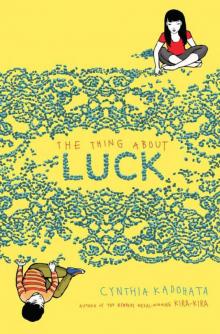 The Thing About Luck
The Thing About Luck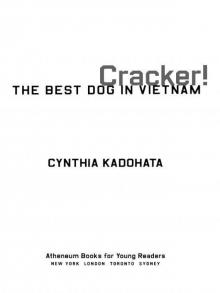 Cracker!: The Best Dog in Vietnam
Cracker!: The Best Dog in Vietnam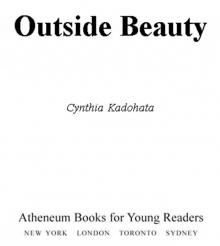 Outside Beauty
Outside Beauty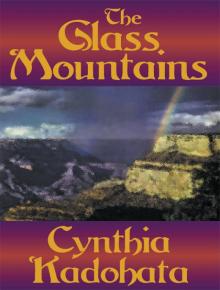 The Glass Mountains
The Glass Mountains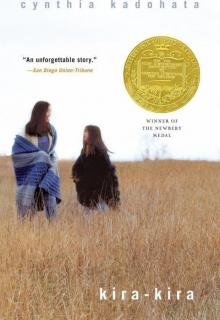 Kira-Kira
Kira-Kira Checked
Checked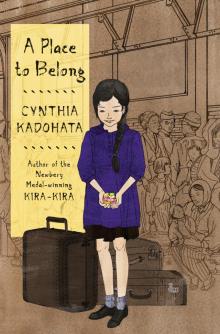 A Place to Belong
A Place to Belong A Million Shades of Gray
A Million Shades of Gray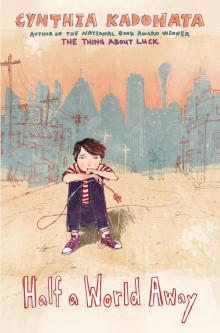 Half a World Away
Half a World Away